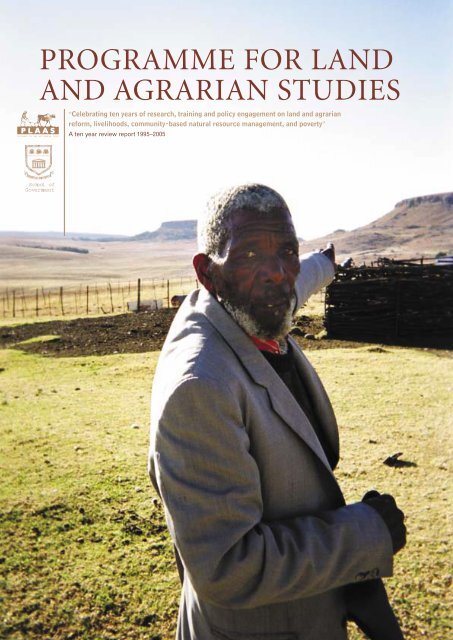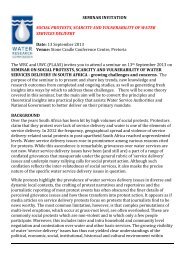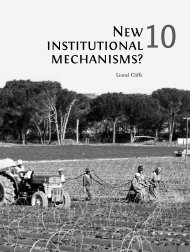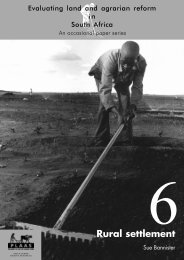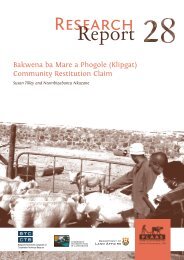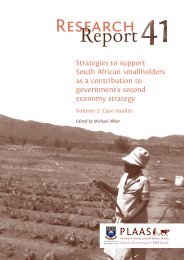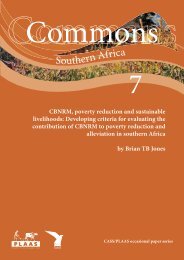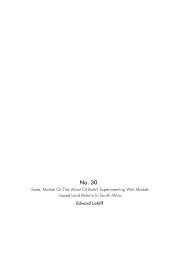Create successful ePaper yourself
Turn your PDF publications into a flip-book with our unique Google optimized e-Paper software.
PROGRAMME FOR LANDAND AGRARIAN STUDIES“Celebrating ten years of research, training and policy engagement on land and agrarianreform, livelihoods, community-based natural resource management, and poverty”A ten year review report 1995–2005School ofGovernment
All of our work hashad a strong applieddimension, and <strong>PLAAS</strong>researchers have oftenengaged in policydebatesINTRODUCTIONThe Programme for Land and Agrarian Studies (<strong>PLAAS</strong>) celebrates its 10th anniversary this year. Over the lastten years we have undertaken research on land and agrarian reform, the changing composition of livelihoodsand poverty dynamics in both rural and urban contexts, rural governance, community-based natural resourcemanagement, fisheries management, and linkages between land and water rights. All of our work has had astrong applied dimension, and <strong>PLAAS</strong> researchers have often engaged in policy debates and argued stronglyin favour of particular objectives and ways to achieve them.Recurring themes within <strong>PLAAS</strong> research are patterns of poverty and inequality, the character anddistribution of property rights, and contested power relations, all of which are central to the task of socioeconomictransformation after apartheid. These are complex aspects of social reality, and understandingtheir structure and the underlying causal processes at work is extremely challenging. We have striven tobalance our concern for policy relevance and our commitment to social change with a strong emphasis onrigorous and theoretically well-informed scholarship.We have also developed a post-graduate teaching programme in land and agrarian studies, the only one ofits kind in the region, and delivered a wide range of short training courses for government officials and NGOworkers.In celebrating our 10th anniversary this year, we will be reflecting on whether or not we manage to live up toour mission, and asking what key questions and issues we should address in the decade to come.<strong>PLAAS</strong>: A BRIEF HISTORY<strong>PLAAS</strong> is a constituent unit of the University of the Western Cape’s School of Government, and was initiatedin 1995 with a core grant from the Ford Foundation. This was renewed biannually until 2003. Ben Cousinswas seconded from the Department of Anthropology and Sociology to establish a programme to train blackapplied social scientists in the land and agrarian reform sector, and to engage in policy-relevant research.Soon after its establishment, <strong>PLAAS</strong> began to provide short courses to government and NGO staff, incollaboration with the Land Tenure Center at the University of Wisconsin-Madison and the Centre for AppliedLegal Studies at Wits University. <strong>PLAAS</strong> researchers were soon contracted by the post-apartheid governmentto provide advice and support to a variety of policy processes, notably in relation to land restitution, tenurereform and agricultural policy. Since then <strong>PLAAS</strong> has seen steady growth and currently employs a staff of 22,of whom 15 are researchers, six with doctorates.The core grant from the Ford Foundation will be phased out from October 2005, but in 2004 <strong>PLAAS</strong> receivedfrom the Foundation a sum of $500 000 towards an endowment fund. Increasing the size of this endowmentis the main focus of our current efforts to secure long-term sustainability. From 2003 the university hassupported the salary of the <strong>PLAAS</strong> Director, and, from 2004, a senior lectureship post at <strong>PLAAS</strong>. All otherpositions are funded through grants from donors or partners.Most income has beenin the form of grantsfrom internationalorganisationsFUNDING, DONORS ANDPARTNERSIncome to <strong>PLAAS</strong> from grants, training fees, consultancies, and publications sales between July 1995 andDecember 2004 amounted to R42 million (see Figure 1). Since 1999 income has averaged around R6 millionper annum.Most income has been in the form of grants from international organisations. Key donors have been the FordFoundation, Liberty Life Foundation, the International Development Research Centre of Canada, the SwissAgency for Development Co-operation, the Foundation for Human Rights (with funds from the EuropeanUnion), the Norwegian government, and the Department for International Development of the United1
R million10 000 0009 000 0008 000 0007 000 0006 000 0005 000 0004 000 0003 000 0002 000 0001 000 0001995 1996 1997 1998 1999 2000 2001 2002 2003 2004Figure 1: <strong>PLAAS</strong> income: 1995–2004Kingdom. Smaller grants have been received from the EuropeanUnion, the Land Bank, the Human Sciences Research Council, theGerman Development Agency (GTZ), the Department of Trade andIndustry, the Department of Environmental Affairs and Tourism(Directorate of Marine and Coastal Management), and the World FishCentre of Denmark.Training courses have also brought in funds. These have beencommissioned by a range of clients, including the Department ofLand Affairs, Danish Co-operation for Environment and Development,the National Land Committee of South Africa, the Environment andDevelopment Agency, Women on Farms, and the Southern Africanoffice of the World Conservation Union (IUCN).Significant funds havealso been sourcedthrough collaborativepartnerships with otherresearch institutionsSignificant funds have also been sourced through collaborative partnerships with other research institutions.Longstanding international partners include the Environment Group at the Institute for Development Studies(IDS) at the University of Sussex, the Institute for Development Policy and Management (IDPM) and theChronic Poverty Research Centre of the University of Manchester, the College of Fisheries Science at theUniversity of Tromsø, the Centre for Environment and Development Studies (Noragric) at the NorwegianUniversity of the Life Sciences, the Norwegian Centre for Human Rights at the University of Oslo, and theInstitute for Fisheries Management & Coastal Community Development (IFM) of Denmark.A close and long established relationship continues with the Natural Resources Group of the Centre forDevelopment Co-operation Services (CDCS) at the Vrije Universiteit in the Netherlands. Dr Stephen Turnerof CDCS was seconded to <strong>PLAAS</strong> for four years (1997-2001) and continues to collaborate with <strong>PLAAS</strong> in avariety of ways.Other important collaborations have occurred with the Land Tenure Center at the University of Wisconsin-Madison, the Overseas Development Institute of London, the International Institute for Environment andDevelopment in London, the University of Bergen and the Chr. Michelsen Institute (both of Norway), theUniversity of Cork in Ireland, the University of Köln in Germany, the African Centre for Technology Studies(ACTS) of Kenya, Community Conservation and Development Initiatives (CCDI) in Nigeria, and the SocialResearch Centre at the American University of Cairo, Egypt. A partnership has recently been established withthe International Water Management Institute (IWMI).Within the region, a longstanding and close working relationship is maintained with the Centre for AppliedSocial Sciences (CASS) at the University of Zimbabwe, principally through joint management of a regionalnetworking and research programme in community based natural resource management. Other regionalpartners include the regional office of the World Conservation Union (IUCN) in Zimbabwe and its office inMozambique.Closer to home, <strong>PLAAS</strong> and the School of Public Health at UWC have developed a close partnership inrelation to poverty research. <strong>PLAAS</strong> has often worked closely with the National Land Committee and itsaffiliates (for example, Nkuzi Development Association, the Association for Rural Advancement, the SurplusPeople Project and the Border Rural Committee) and other NGOs such as the Centre for Rural Legal Studies,the Legal Resources Centre, the Legal Entity Assessment Project and the Trust for Community Outreach andEducation. A close collaborative relationship to provide short course training has been maintained since1996 with Rick de Satgé of Developmental Services.An excellent long-term research partnership with Prof Timm Hoffman, formerly at the National BotanicalInstitute and currently Director of the Leslie Hill Institute of Plant Conservation, has been maintained since1995, centred on multi-disciplinary research in the Leliefontein Communal Area of Namaqualand. A <strong>PLAAS</strong>Research Associate, Dr Rick Rohde, has led the socio-economic aspects of this research for <strong>PLAAS</strong>.Collaborative research and teaching have been undertaken with lawyers from the Legal Resources Centre,and individual scholars from the Universities of Cape Town, Stellenbosch, Rhodes and Witwatersrand, andalso with researchers from the Integrated Rural and Regional Development programme of the HumanSciences Research Council.2
STAFFINGSeven months after <strong>PLAAS</strong> was initiated in 1995, its staff comprised the Director, an Administrator, and twoA range of staff Researchers (Andries du Toit and Thembela Kepe). By 1999 the staff complement had risen to 16, and bydevelopment activities July 2005 it was 22 (fifteen research and seven support staff). At present the majority of <strong>PLAAS</strong> staff (76%)are black, and 64% of researchers are black. In terms of gender, 52% of staff are women, but only 36% ofare undertaken at <strong>PLAAS</strong>researchers are women.The following researchers have been employed at <strong>PLAAS</strong> since 1995:Fadeela Ally-Schmidt, Prof Ben Cousins (Director), Dr Andries du Toit, Dr Cobus de Swardt, William Ellis,Ruth Hall, Dr Mafaniso Hara, Dr Moenieba Isaacs, Dr Peter Jacobs, Dr Thembela Kepe (Deputy Director),Karin Kleinbooi, Dr Edward Lahiff, Dr Frank Matose, Najma Mohamed, Kgopotšo Mokgope, David Neves,Phinda Ndabula, Dr Lungisile Ntsebeza, Zolile Ntshona, Hayley Rodkin, Munyaradzi Saruchera, BarbaraTapela, Dr Stephen Turner, Lungiswa Tsolekile and Webster Whande.A number of researchers have also been employed on short–term contracts or as consultants: Dr MichaelAliber, Aninka Claassens, Jeanette Clarke, Xakathile Dabula, Tsakane Khosa, Irma Maharaj and Dr RickRohde. Babalwa Bata, Thandi Lewin, Fazel Moosa, Sibongile Mtini, Zuko Ndamane, Tumi Taaibosch andVuyani Zondani were employed as Research Assistants.Research projectsundertaken by <strong>PLAAS</strong>seek to draw policylessons from in-depthcase studies informedby relevant conceptualframeworksAdministrative staff employed in this period have included: Gretna Andipatin, Ursula Arends, RowenaChristian, Natashia Emmett, Lulekwa Gqiba, Tobias Helm, Robertha Isaacs, Bealah Jacobs, Nazlie Jamie,Diana Josephus, Edgar Joshua, Dumani Kentane, Priscilla-Anne Lewis, Vivian Magerman, Ithra Najaar,Jenny Plandt, Allan Roman and Nobomvu Toleni.A range of staff development activities are undertaken at <strong>PLAAS</strong>. The major thrust to date has been ‘on thejob’ training, hiring researchers for specific research projects that create opportunities for post-graduatestudy, mainly in the form of dissertation-based degrees. The following staff members have completed higherdegrees while working at <strong>PLAAS</strong>:• Moenieba Isaacs (PhD, Fisheries Management, UWC, 2004)• Thembela Kepe (PhD, Development Studies, UWC, 2002)• Lungisile Ntsebeza (PhD, Sociology, Rhodes, 2003)• Zolile Ntshona (MPhil, Development Studies, UWC, 2002)• Webster Whande (MPhil, Land and Agrarian Studies, UWC, 2004)<strong>PLAAS</strong> researchers currently registered for higher degrees at UWC are Barbara Tapela (PhD), WebsterWhande (PhD), Karin Kleinbooi (MPhil), and Ursula Arends (MA). Ruth Hall is registered for a DPhil atOxford.Other forms of staff development have included two Summer Schools on Research Skills for Land andAgrarian Studies, sending staff on short courses organised by other institutions, in-house staff or PhDseminars, and visits to international research centres at universities abroad (Norway, UK, USA, Zimbabwe).RESEARCH AND NETWORKINGPROJECTSResearch projects undertaken by <strong>PLAAS</strong> are usually two to three years in duration, are field-based rather thandesk-top studies, and seek to draw policy lessons from in-depth case studies informed by relevant conceptualframeworks. Projects aim to understand social, economic, political, institutional and environmentaldynamics, and complex interactions between them, at both the local and wider levels. Both qualitative andquantitative methods are employed, with particular emphasis on the former. (A list of projects undertakensince 1995 can be found on the poster side of this report.)3
Critical scholarshipneeds to be selfcritical;both vigour andrigour are required forinformed public debatePOLICY ENGAGEMENTThe university’s mission statement commits it to ‘responding in critical and creative ways to the needsof a society in transition’, and to ‘helping build an equitable and dynamic society’. Is this kind of publicengagement at odds with the traditional emphasis at universities on teaching, learning and researchundertaken within a spirit of scientific enquiry? In our view it is not, but we do recognise the tension betweenthe two stances. We are committed to rigorous, independent and open-minded research, to debate andpotential disagreement amongst ourselves, and to admitting the possibility of error or mistaken judgementin both research and policy advocacy. Critical scholarship needs to be self-critical; both vigour and rigour arerequired for informed public debate.<strong>PLAAS</strong> researchers have engaged with policy processes since 1995, in a variety of different ways. They haveworked closely with various government departments, as advisors at national, provincial and local level,as consultants in the design or facilitation of programmes or projects, as reviewers or evaluators, and asfacilitators of policy workshops. Researchers have often been asked to present their views to the variousportfolio committees of Parliament.<strong>PLAAS</strong> researchers have also provided critiques of different policies, published articles and academicpapers, participated in public debates, and made presentations at policy workshops and conferences. Inrecent years staff members have been active within a number of emerging civil society alliances in the landand agrarian reform sector, and have sought to contribute to deepening the understanding of key policyissues by members of NGOs and community-based organisations. <strong>PLAAS</strong> researchers have been activein the following policy debates: land restitution, land redistribution, land tenure reform, land reform andenvironmental concerns, the Wild Coast Spatial Development Initiative, agricultural policy, minimum wagesfor farm workers, community-based natural resource management, communal rangeland management,forestry policy, traditional leaders and local government reform, subsistence and artisanal fisheries policy,co-management of marine and coastal resources, poverty reduction, food security and ethical trade in thewine and fruit industries.Dissemination ofresearch findings tothose who can makeeffective use of them isvitally important for anapplied research unitExamples include Andries du Toit’s co-ordination of a Ministerial Review of the restitution programme in1998, Ben Cousins’ contributions to formulation of tenure reform policy between 1996 and 1999, ThembelaKepe’s advice on implementation of the Wild Coast Spatial Development Initiative in 1997/98, and LungisileNtsebeza’s submissions on policies on traditional leaders and local government. Stephen Turner led a teamadvising government on policies for integrating environmental issues into land reform in 1996/97, and a teamthat evaluated donor support for the land reform programme, in 1998.Munyaradzi Saruchera and Ben Cousins helped draft the Lagos Declaration on Land and Resource Rights inAfrica, which was presented at the World Summit for Sustainable Development in 2002. Between 2002 and2003, <strong>PLAAS</strong> researchers and the National Land Committee facilitated a process of community consultationon the Communal Land Rights Bill, which culminated in community submissions during parliamentaryhearings. Edward Lahiff, Ruth Hall and Peter Jacobs have contributed to the People’s Budget since 2003.Andries du Toit and Cobus de Swardt assisted in the formulation of Western Cape provincial food securitypolicies in 2003 and 2004.The legal arena has been another important context for policy engagement. <strong>PLAAS</strong> was an amicus curiae inthe Modderklip case initiated in 2003, and individual researchers have presented evidence in support of legalaction by communities (e.g. on housing or fisheries management). <strong>PLAAS</strong> researchers have also presentedtheir views in hearings called by the Human Rights Commission (e.g. on conditions on commercial farms),and in a popular tribunal on land policy organised by the Trust for Community Outreach and Education.PUBLICATIONSDissemination of research findings to those who can make effective use of them is vitally important for anapplied research unit, and publications are a key output. <strong>PLAAS</strong> publishes books, conference proceedings,research reports, occasional papers, policy briefs, newsletters and information bulletins. Some are publishedin collaboration with partners such as the Institute of Development Studies at the University of Sussex, theOverseas Development Institute in London, Noragric at the Norwegian University of Life Sciences, and theChronic Poverty Research Centre at the University of Manchester, and this helps to ensure a wide audience.4
Between mid-1995 and mid-2005, <strong>PLAAS</strong> published a total of five books, 21 research reports, 49 occasionalpapers, 23 policy briefs and eight newsletters and information bulletins. A great deal of effort has gone intoproducing high-quality publications in terms of both their content and their design and layout. Demand for<strong>PLAAS</strong> publications is consistently high, and many have had to be reprinted. Income derived from saleshelps to meet the costs of reprinting.<strong>PLAAS</strong> researchers also publish widely in a range of other contexts. Since 1995 a total of 40 journal articlesand 53 book chapters have appeared with <strong>PLAAS</strong> staff members as authors or co-authors. Researchers havealso authored or co-authored 64 research reports, 21 occasional papers and 15 policy briefs, and 38 articlesby them have appeared in popular magazines and newspapers.In addition to their publications, <strong>PLAAS</strong> researchers are regularly asked for comment by a wide range ofnewspapers, magazines and radio and television programmes, both locally and abroad.CONFERENCES, WORKSHOPSAND SEMINARS<strong>PLAAS</strong> organises<strong>PLAAS</strong> organises conferences, symposia, workshops and seminars to disseminate research findings and tocreate forums for discussion and debate of their wider significance and policy implications.conferences, symposia,workshops and seminarsto disseminate researchfindingsNotable occasions in the last ten years include the Land and Agrarian Reform Conference of July 1999,organised in collaboration with the National Land Committee, and attended by over 200 researchers,government officials and NGO staff members, and the international symposium on Contested Resources:Challenges to the Governance of Natural Resources in Southern Africa, held in October 2000, with over 100participants. This was organised in collaboration with UWC’s Centre for Southern African Studies, and drewresearchers from across the region.Other highlights include a symposium on African Perspectives: Land and Sustainable Development,organised by <strong>PLAAS</strong>, the National Land Committee, and the African Institute for Agrarian Studies duringthe World Summit for Sustainable Development (WSSD) held in Johannesburg in August 2002, and aninternational workshop on Tenure Reform in Africa: Lessons for the Communal Land Rights Bill, held in July2002. In October 2002, <strong>PLAAS</strong> and the Norwegian Fisheries College at the University of Tromsø, Norway, cohostedan international symposium on Transformation of the South African Fishing Industry.A workshop on Rangelands at Equilibrium and Non-equilibrium at the VII th International Rangelands Congressin Durban in July 2003 was organised in collaboration with the Leslie Hill Institute for Plant Conservation ofUCT and the Botany Department at Rhodes University, and attracted a great deal of attention.Smaller international events in the past ten years include five regional workshops on issues of communitybasednatural resource management, organised jointly with the Centre for Applied Social Sciences ofthe University of Zimbabwe, several continent-wide workshops as part of the collaborative Pan-AfricanProgramme on Land and Resource Rights, and a number of international workshops on co-management offisheries.A large number of national and provincial workshops have been organised by <strong>PLAAS</strong> researchers to discussresearch findings on ethical trade in the fruit and wine industries, trends in the agricultural labour market,poverty and inequality, sustainable livelihoods, communal rangeland management, biodiversity conservationand land restitution, and land and agrarian reform policies.A regular <strong>PLAAS</strong> seminar series includes presentations by <strong>PLAAS</strong> researchers as well as South African andinternational visitors; a total of 67 seminars, on a wide range of topics, have been held since 1995.5
<strong>PLAAS</strong> has establishedthe first post-graduateprogramme in Land andAgrarian Studies in thecountry and in the regionTEACHING ANDSUPERVISION<strong>PLAAS</strong> has established the first post-graduate programme in Land and Agrarian Studies in the country andin the region. Teaching and supervision is currently undertaken for Post-Graduate Diploma, MPhil and PhDstudents. The programme aims to meet an identified demand in the land and agrarian reform sector in theSouthern African region for post-graduate training in policy analysis skills, and to service a range of careeroptions within these sectors (e.g. planners, policy makers, fieldworkers and researchers). Most students arein full-time employment, and teaching takes place in three intensive ‘block-release’ periods during the year.The specific objective of the programme is to develop appropriate knowledge and skills that will enable policymakers, planners, managers, researchers and field workers in the sector to:• conceptualise key policy issues of land and agrarian reform• analyse problems of policy formulation and programme design• plan effective programmes and projects• undertake research on important questions of policy and practice.Most MPhil students write mini-theses. The MPhil by full thesis and PhD degrees are generally pursued bythose students who intend to work as researchers or academics.The first <strong>PLAAS</strong> PhD student was registered in 1997. The Post-Graduate Diploma and MPhil coursecommenced in 2001 and numbers have risen steadily over the past four years, attracting students fromNamibia, Mozambique, Zimbabwe, Lesotho and Tanzania as well as South Africa. At present 85 students areregistered, including seven PhD students, 31 MPhil and 47 Diploma students. Graduates to date number 22.Throughput of students is slower than anticipated, mainly due to the demanding nature of part-time study forthose in full-time employment.In 2003, <strong>PLAAS</strong> won the Group Award from UWC’s Division for Lifelong Learning for its innovative approachto recognition of prior learning for entrants to the post-graduate programme.In addition to undertaking teaching and supervision on Land and Agrarian Studies, <strong>PLAAS</strong> staff also teachon the Rural Development and Natural Resource Management modules offered by the School of Governmentand on the Development Studies programme at the Norwegian University of Life Sciences. They giveoccasional lectures in the Rural Development module offered by the Institute of Social Development at UWC,and in different departments at the Universities of Cape Town and Stellenbosch.<strong>PLAAS</strong> has been animportant provider ofshort course and inservicetraining to theland and agrarian reformsectorSHORT COURSE TRAINING<strong>PLAAS</strong> has been an important provider of short course and in-service training to the land and agrarianreform sector. Since 1996, <strong>PLAAS</strong> researchers, often in collaboration with Rick de Satgé of DevelopmentalServices, have been commissioned to design and develop a range of short courses customised to meet theneeds of different government departments (notably the Department of Land Affairs) and NGOs (amongstothers the National Land Committee and its affiliates, and the Women on Farms Project). Some courses havebeen regional in scope, and have drawn participants from across southern Africa and have been offered incollaboration with the Land Tenure Center of the University of Wisconsin-Madison, and the Centre for AppliedLegal Studies (CALS) at Wits, and others with the Centre for Applied Social Sciences at the University ofZimbabwe.Courses have included the following: Land Tenure and Policy in South Africa; Tenure Basics; Land RestitutionPolicy and Procedures; Land Use and Livelihoods; The Integration of Environmental Planning into LandReform; Governance in Community-Based Natural Resource Management; Social Science Perspectives onNatural Resource Management.A total of over 500 participants have attended these courses, and their evaluations of the training they havereceived have been overwhelmingly positive.6
MISSION• <strong>PLAAS</strong> engages in research, training, policy development and advocacy inrelation to land and agrarian reform, rural governance and natural resourcemanagement.• <strong>PLAAS</strong> is committed to social change that empowers the poor, buildsdemocracy and enhances sustainable livelihoods. Gender equity is integral tothese goals.• <strong>PLAAS</strong> aims for rigour in its scholarship, excellence in its training, andeffectiveness in its policy support and advocacy. It strives to play a criticalyet constructive role in processes of social, economic and politicaltransformationProgramme for Land and Agrarian StudiesSchool of GovernmentUniversity of the Western CapePrivate Bag X17Bellville 7535Cape TownSouth AfricaSchool ofGovernmentTel: +27 21 959 3733Fax: +27 21 959 3732plaas@uwc.ac.zawww.uwc.ac.za/plaas


